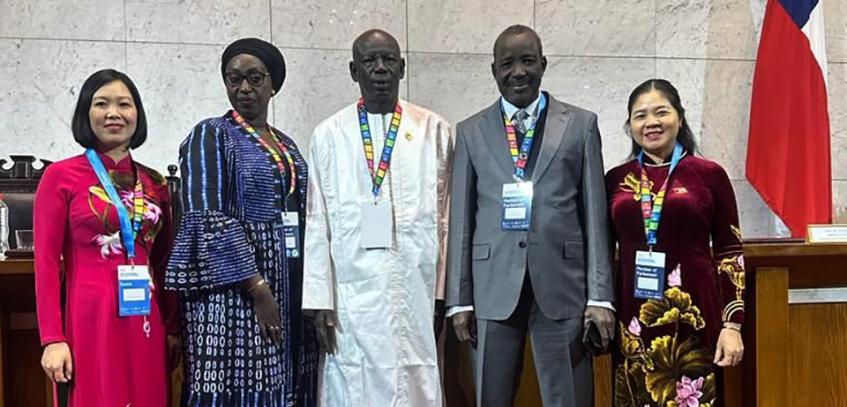The Pan-African Parliament (PAP) is ramping up efforts to build Continental and global coalitions to achieve food security in Africa.
In this regard, a delegation of the continental Parliament has wrapped up its participation in the Second Global Parliamentary Summit Against Hunger and Malnutrition, held in Valparaiso, Chile in June 2023.
The purpose of the summit was to provide a platform for parliamentarians from around the world to come together and address the urgent challenges of hunger and malnutrition, with the aim of formulating effective strategies and fostering greater collaboration to achieve global food security and improved nutrition outcomes.
Organised by the Food and Agriculture Organization of the United Nations (FAO) in collaboration with the Spanish Agency for International Development Cooperation (AECID), the National Congress of Chile, and the Government of Chile, the two-day meeting sought to emphasise the important role of Parliamentarians in the transformation of global agrifood systems, to make them more efficient, more inclusive, more resilient and more sustainable.
Global Parliamentarians reaffirmed the urgency of ending hunger and malnutrition in all its forms as a prerequisite for achieving Sustainable Development Goals, emphasizing the crucial role that parliamentarians can play in ensuring food security and nutrition, including through the adoption of gender-sensitive approaches.
In his statement to the Summit, delivered by Hon. Assane Marou Dit Koubou, Rapporteur of the Committee on Rural Economy, Agriculture, Environment, and Natural Resources, the President of the Pan-African Parliament described steps undertaken by the Continental Parliament to ensure that food security remains top of the agenda as Africa continues to bear the brunt of hunger in the face of Covid-19, climate change and the conflict in Ukraine. He called for enhanced parliamentary synergies to address hunger and malnutrition as integral components of global sustainable development goals.
“Investing in human capital is more important than ever, as is designing and approving the interventions needed to achieve it, targeting in particular the most vulnerable sectors of the population. Based on this vision, the African Union Assembly endorsed and launched in February 2022 the African Union Year of Nutrition under the theme “Building Resilience in Nutrition and Food Security on the African Continent: strengthening agri-food systems, health and social protection systems to accelerate the development of human, social and economic capital”.
“This vision has guided the work of the Pan-African Parliament in building coalitions to identify solutions to persistent nutrition challenges on the continent, with a focus on strengthening African agrifood, health and social protection systems through multi-sectoral responses that promise significant gains far beyond improving nutritional outcomes, catalyzing social, economic and human capital development across the continent,” said H.E. Hon. Chief Charumbira.
The Pan-African Parliament’s participation in the Second Global Parliamentary Summit Against Hunger and Malnutrition stems from its collaboration with the FAO.
Pan-African Parliament and FAO signed a Memorandum of Understanding in 2016, establishing the Pan-African Parliamentary Alliance for Food Security and Nutrition (PAPA-FSN). The agreement seeks to position food security and nutrition issues at the highest level of the political and legislative agendas in line with Africa’s developmental objectives; and to strengthen the PAPA -FSN and related subregional as regional platforms for African Members of Parliament to discuss and agree on critical issues related to food security and nutrition.
The relationship has produced a Model Law on Food and Nutrition Security, adopted by the PAP Plenary in November 2022. The Parliament and FAO are currently exploring an additional four model laws – gender equality, soil management, climate change and the development of cooperatives.
The partnership between the two institutions aims to capitalise on the crucial role of Parliamentarians in setting the political and legislative agendas, enacting laws, and playing a budgetary and oversight role on public spending and public policies. This role is deemed significant in the broader process of eradicating hunger and malnutrition.
-Ends-








